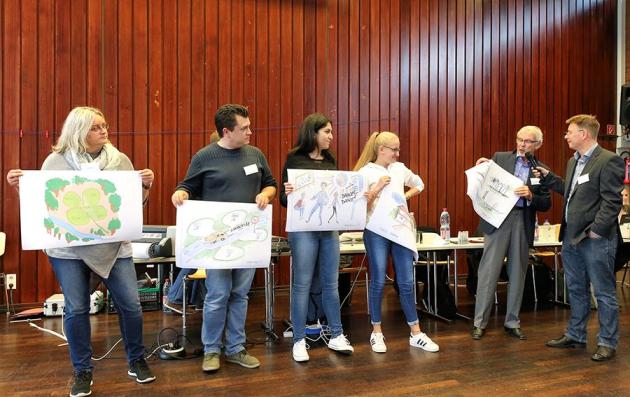Date of label : 29/10/2024
-
Dusseldorf , Germany
-
Size of city : 655.700 inhabitants

This image shows a group of six individuals standing in a line, each holding up a large sheet of paper with various drawings and illustrations. The overall scene suggests a collaborative or educational activity, where participants are presenting their ideas or projects through visual illustrations.
Summary
Düsseldorf (DE) used the opportunity of an URBACT network to transfer innovative approaches from other cities to the needs of its urban fringe. A key feature in Garath, a suburb on Düsseldorf’s southern fringe, is public involvement in creating an Integrated Action Plan, which was approved by the city council in 2017 and continues until 2027. The aim is to improve the life of people in socially-deprived urban areas. Conclusions gained from its implementation are now part of the Integrated Neighbourhood Development, ‘ZUKUNFT QUARTIER.DÜSSELDORF’ (ZQ.D), with lessons learned also transferred to other areas in Düsseldorf. Public and private funding has been allocated in this comprehensive approach, and its benefits are experienced first-hand in the daily lives of Garath’s residents.
The solutions offered by the Good Practice
The Integrated Action Plan (IAP) for Garath reflects input from residents and experts, on areas such as the suburban centre, housing, architecture, green areas, education, culture, and public strategy. Key milestones were the opening of the district office, with neighbourhood management for residents' questions and requests, and the city management’s contact point for shop owners.
The reopening of the Freizeitstätte Garath, after its energy-efficient renovation and modernisation, has boosted cultural and social life. With its café, meeting rooms and programme of activities, the cultural centre acts as a community hub for neighbourhood residents and also attracts people from outside the area.
Seven newly-designed playgrounds and green spaces promote exercise, sport and socialising. A new parkour facility meets young people’s expectations, while local housing companies are investing in and improving properties, and renovating public green spaces, with the help of subsidies. The new comprehensive school promotes education and training for the younger generation, while a children's parliament fosters early democratic engagement. A recent evaluation highlights climate and health as future priorities.
Building on the sustainable and integrated urban approach
The integrated planning approach relies on ongoing public participation, and included a branding exercise, a children's parliament, and many opportunities for residents of all ages to express their views. In this way, the participation process serves both to plan measures, and to strengthen civic engagement and empowerment.
The resulting Integrated Action Plan (IAP) includes a complementary set of measures, covering all the neighbourhood areas. These measures were assessed by a steering committee, with representatives from green planning, urban planning, social work and others departments, to ensure the plan integrated different goals.
For example, the modernisation of the Freizeitstätte Garath prioritised both energy efficiency and social inclusion through its cultural programme and partnerships, such as the café which helps reintegrate people into society.
Based on participatory approach
Neighbourhood management supports grassroots (bottom-up) initiatives, with the “Verfügungfonds” (district funds) advisory board meeting regularly since 2017. Citizens, associations and institutions can apply for funding for smaller civic projects, with 250 projects funded so far, totalling EUR 270 000. The board, consisting of residents and institution representatives, fosters democratic participation, which is especially valuable in a district where many people do not vote.
Twice a year, political and social group representatives meet to discuss diverse projects, such as evening markets, group singing, kindergarten visits to senior clubs, and internet assistance. In contrast to top-down approaches, ZQ.D projects use agile methods involving various interest groups, including politicians, the Lord Mayor, all relevant stakeholders, neighbourhood institutions and citizens, through conferences, workshops and social media. This flexible working method allows for early feedback and adjustments to improve performance.
What difference has it made?
Garath has 19 000 residents who benefit from newly-designed playgrounds, the modernised Freizeitstätte Garath, and other upgraded facilities. Previously, students could not obtain a higher level school-leaving certificate (Abitur) in Garath, but this is now possible with the new comprehensive school. The swimming pool has a new lifting floor, making it accessible to children under six years and older people.
With Garath having an above-average number of children and young people, a special focus was put on providing facilities for this age group, with playgrounds, the new school, a children's parliament, and two new youth facilities. The playgrounds are distributed throughout the district to bring them closer to more young people.
Most of Garath’s apartments belong to large housing associations involved in the planning process, and in improving both buildings and green spaces. The high street is lively and has no vacancies, but centre management is still committed to further improvements. Garath's image has improved, attracting more people to live there.
Why this Good Practice should be transferred to other cities
The integrated approach helps achieve Sustainable Development Goals (SDGs), notably by reducing inequalities (SDG 10). It implements the Urban Agenda for the EU at local level, for example, by upgrading green spaces and children's playgrounds, and the EU's Territorial Agenda, by developing new measures in cooperation with local people to improve their living conditions.
Garath’s Integrated Neighbourhood Development is financed by the municipal budget, North-Rhine Westphalia funds and EU funds (ERDF and ESF).
Every Düsseldorf district has its own character, but they all have many things in common, facilitating the transfer of the approach. By integrating the work of all relevant stakeholders in an agile way, talents can be nurtured and risks minimised. The plan is to spread integrated and agile working within the city administration.
International exchanges such as URBACT support innovative and the implementation of new approaches, as can cooperation with municipalities at national level. Process management is needed because the approach is complex and communication is key to knowledge transfer. Also vital for a successful transfer of the practice is the political commitment of the city council, and the availability of necessary financial resources.
